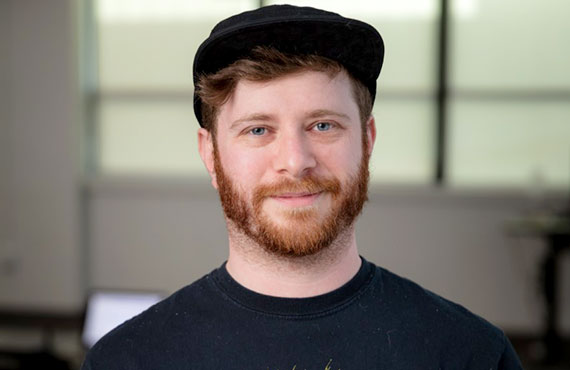With a career in CS and music technology, alum Robby Grodin says mentorship is key
Author: Madelaine Millar
Date: 09.30.20

Photo provided by Robby Grodin (BS ’12).
Robby Grodin listens to vinyl records while he codes. For one thing, putting on a new Yellow Eyes album gets him up out of his seat every 20 minutes; for another, it gives him a way to bond with other coders/music aficionados. As the lead developer at the fan engagement startup Jambb, though, the relationship between music and computer science goes much deeper for Grodin, a Khoury College alum.
“(Coding and music) are two sides of the same coin,” said Grodin. “The Zen of composing music and just the feeling of struggling, and struggling, and struggling, and then at the very end you get this sudden ‘Aha!’ moment, and it’s right there in front of you and it’s all paid off — it’s very similar to coding. Coding is, 95 percent of the time, feeling like you’re screwing it up, and then that final 5 percent you’re like, ‘Oh, I did something amazing’.”
Grodin (BS ‘12 in CS and music technology) didn’t enter Northeastern as a computer science student; at first, he was focused entirely on music. His first introduction to coding came the summer after his sophomore year when he took a class on the coding language SuperCollider, which allows users to write code that plays back as music. He was hooked, and declared a combined major that very summer, adding CS to music technology.
At Northeastern, both in class and outside of it, Grodin spent his time exploring the intersection of computer science and music. He participated in hackathons, did a stint as a quality assurance engineer at a local music tech company, co-oped at Blackberry, and had a multi-year gig helping with daytime technology programming at the Together Boston festival that he’d found through the school.
“It was like a 24/7 thing. I would go to class, and I would go home and do homework, and I would work on these awesome projects,” said Grodin. “It was the type of education that wasn’t just you go to class and you go home; it was really the key to my entire life.”
After graduation, Grodin moved to San Francisco to try to break into the music tech industry. Suddenly, he went from an environment where mentors were plentiful to one where he had none at all.
“It was exciting and it was also kind of scary, because I was a brand new coder. I was in a city where I knew nobody, and I didn’t have a mentor, and that’s something that’s really stuck with me ever since,” said Grodin. “There’s so much to learn, and being new to the industry without somebody to help – it’s really scary.”
Grodin carried this lesson about the importance of mentorship with him all the way to his current position as lead developer at Jambb, a startup that is creating an engagement platform to help social media creators grow their businesses through better connections with fans. In his non-work time he offers pro bono mentorship and coaching sessions, focused particularly on women and BIPOC (Black and Indigenous People of Color) in all areas of tech.
“I have had many occasions where people are excited to come in and work with me, with my team. They’ve got an offer. But as soon as they get the offer there’s trepidation, because when you’re asking a woman to be the first woman on the team, when you’re asking a person of color to be the first person of color on a team — it’s scary,” said Grodin. His experiences with mentorship opportunities as an undergrad at Northeastern have helped him develop his own practice as a mentor.
He’s made sure that his employer reflects his values too. Since its founding, Jambb has employed a Diversity, Equity, and Inclusion professional as their Head of People, and they work to have conversations about diversity at every step of the development process.
In his view, diversity and inclusion go beyond values. “I worked on so many teams and so many different industries, and there is one thing that has remained constant: diverse teams build better solutions,” said Grodin.
Jambb is looking to hire its first Northeastern co-op in January of 2021. Grodin’s advice for prospective co-ops — and for students in general — is to spend time exploring your passions and developing your identity.
“Coding is just a skill. It’s not a domain,” said Grodin. “If you’re getting a CS degree and you’re only getting a CS degree, you’re doing it wrong…The thing about coding is that it’s a superpower, in a way. You can do anything that anyone else can do, but better.”
Want to spend a little more time in Robby Grodin’s world? Try coding to some of his favorite music.